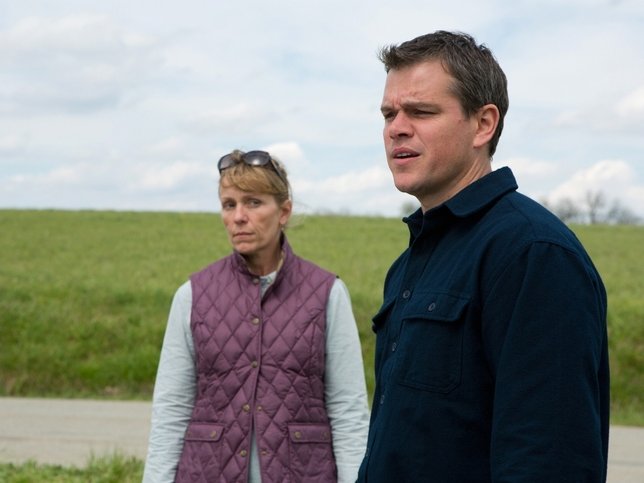A well-executed twist can turn a good movie into something legendary. Of course, that's not to say that the rest of the film can just prattle about and rely on the big reveal to make everything good, but a surprising, thought out twist that works in correlation with the characters and story that came before can make for some of the most memorable movie-watching moments.
Just ask directors like Christopher Nolan, David Fincher or M. Night Shyamalan (eh, maybe not M. Night anymore).
In case that opening paragraph didn't give it away, there is a twist near the end of "Promised Land," the Matt Damon-led anti-fracking drama. I won't spoil it here, but it's dumb and preachy, a bad combination. It's quite a shame because before that audience-insulting turn of events, "Promised Land" is a modest, pleasant film about modest, small-town life.
Damon – who also co-wrote, produced and almost directed before stepping down – stars as Steve Butler, a corporate salesman climbing the ladder at a natural gas company. He's en route to a promotion, but before his pay hike, he has to take a hike to a small Pennsylvania town and get the residents to sign over the rights to drill on their properties.
Though the city may be small, the profits potentially hiding underneath could be massive, and getting it to go with natural gas – providing Steve's company a huge entry point for the rest of the state – could be even bigger.
With his co-worker Sue (a predictably winning Frances McDormand) in tow, Steve works his way through the town, signing the believers and converting the skeptics. However, at a should-be shoe-in town meeting, a local teacher (Hal Holbrook) raises some questions about the safety of fracking that get the rest of the citizens concerned.
Suddenly, what was once a sure thing is now getting put to a vote, and an energetic young environmentalist (John Krasinski) is making the rounds, convincing most of the townsfolk to vote no with personal stories of dead cattle and lost farmland.
It should come as no surprise that "Promised Land" is on the side of the friendly old Holbrook and the anti-fracking movement. Damon and Krasinski's script, based on a story from Dave Eggers, spares no expense showing that Steve is not to be trusted, whether it be bribing and low-balling the town's spokesman, or getting into costume – plaid, jeans and boots – as a relatable, small-town fellow.
And despite Steve's multiple tirades against small-town America and its "dillusional self-mythology," director Gus Van Sant (who previously worked with Damon on his breakthrough "Good Will Hunting") films the region with clear affection. He even takes a moment for a montage of locals posed by photogenic rusty décor and lovingly photographed fields and streams.
While the pieces are all in place for an environmental sermon, most of "Promised Land" feels more like an intriguing debate rather than a tedious lecture. The script thankfully puts a significant amount time aside for humanity, character and some really crackling exchanges. Some of them are fun and charming, namely Steve's flirty banter with his local love interest, played by Rosemarie DeWitt. Others tensely sizzle, like a diner table discussion that moves control from player to player like a verbal tennis match.
Most of the thanks, however, belong to the clever casting. Damon uses all of his mellow, unassuming charm to make Steve warm and likeable, sparking fun chemistry with McDormand and DeWitt. Combined with Krasinski's slightly smug turn as his rival, Damon's arguments for fracking and against blind Americana end up far more persuasive than the film may expect.
He may be blind himself, but he's not dumb and neither are his arguments. As a result, even despite itself, the audience gets an interesting conversation about fracking, natural gas and the rewards – and cost – of small-town America.
For the most part, that is. Unfortunately, after building appealing characters and a central conflict with a moderately even hand, the last act of "Promised Land" stumbles its way to the ending. DeWitt's cute romantic subplot becomes aimless and underdeveloped. The anti-corporate message loses its nuance and gets written in all caps, bolded and underlined (mainly by a caricature of a caricature of a country hick, played by Lucas Black).
Then there's the aforementioned twist, which really sours the film. It condescendingly pounds the point in as though it was afraid the audience wasn't paying attention, leaves several uncomfortable loose ends and just doesn't make sense.
A fleeting moment of thought or reflection is all that's needed to tear man-sized holes into its contrived sense of logic. Much like how drilling wipes out the cows and crops on Krasinski's farm in "Promised Land," the message eats away at the story and characters.
Van Sant's good-natured film, however, isn't escaping this review without a mild recommendation, if partnered with another recommendation. When "Promised Land" has about 15 minutes left, make your way out of the theater. Choose your own ending. It'll be better than the one on screen.
As much as it is a gigantic cliché to say that one has always had a passion for film, Matt Mueller has always had a passion for film. Whether it was bringing in the latest movie reviews for his first grade show-and-tell or writing film reviews for the St. Norbert College Times as a high school student, Matt is way too obsessed with movies for his own good.
When he's not writing about the latest blockbuster or talking much too glowingly about "Piranha 3D," Matt can probably be found watching literally any sport (minus cricket) or working at - get this - a local movie theater. Or watching a movie. Yeah, he's probably watching a movie.







